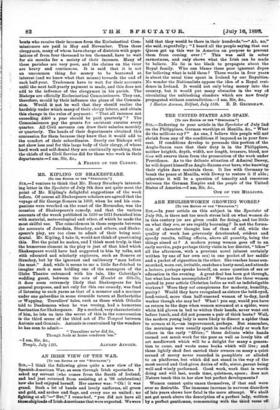MR. KIPLING ON SHAKESPEARE.
[To THE EDITOR OF THE " SPECTATOR."' SIR,—I venture to think that Mr. Henry Strachey's interest- ing letter in the Spectator of July 9th does not quite meet the point of Mr. Kipling's delightful suggestions of the week before. Of course all Shakespeare scholars are agreed that the voyage of Sir George Somers in 1609, when he and his com- panions were wrecked on the coast of the Bermudas, was the occasion of Shakespeare's comedy, and that the various accounts of the wreck published in 1610 or 1611 furnished him with material, meteorological and other, of which he made the most skilful use. The coincidences in these respects between the accounts of Jourdain, Strachey, and others, and Shake- speare's play, are too close to admit of their being acci- dental. Mr. Kipling, I take it, would not think of questioning this. But the point he makes, and I think moat truly, is that the humorous element in the play is just of that kind which Shakespeare would have had suggested to him by talks, not with educated and scholarly explorers, such as Somers or Strachey, but by the ignorant and unliterary " man before the mast." And, while it seems to me a little far-fetched to imagine such a man holding one of the managers of the Globe Theatre entranced with his tale, like Coleridge's wedding guest, between the acts of Hamlet or Othello, it does seem extremely likely that Shakespeare for his general purposes, and not only for this one comedy, was fond of listening to such yarns as that of a monster and a mariner under one gaberdine in some riverside tavern at Rotherhithe or Wapping. Travellers' tales, such as those which Othello told to Desdemona when he was wooing, had a humorous fascination for Shakespeare. By a method, very characteristic of him, he lets us into the secret of this in the conversation in the third scene of the third act of The Tempest between Antonio and Gonzalo. Antonio is constrained by the wonders he has seen to admit-
" Travellers ne'er did lie, Though fools at home condemn 'am."
—I am, Sir, &c.,


































 Previous page
Previous page